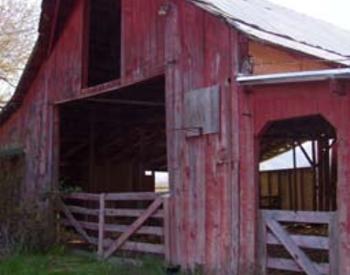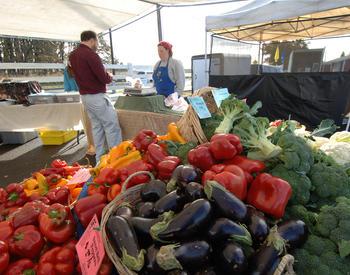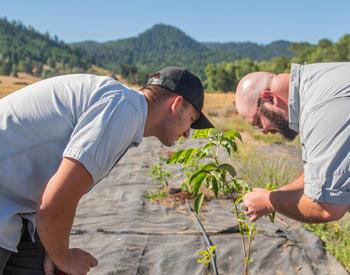1. Find a quality farm/rural land real estate agent
Many real estate agents are knowledgeable only about city property and turnkey house buying, so find an agent who knows about farming and the details that are important, like soil types and water rights.
A good real estate agent will take the time to seek out critical information and guide you in decisions regarding zoning, easements and other complicated issues. Rural real estate is complex, so finding a good agent experienced in land purchasing is a necessary investment.
2. Proximity to markets
How close is the farm to your local markets and distribution channels? If you have to drive 50 miles before you reach your local farmers market, is it worth the cost, energy and time associated with the distance? Are there other farms in your neighborhood that also have to make the commute?
3. Land history — cultural and physical
What sort of people lived on the land and what are the stories associated with the buildings? For instance, our farm is the location of an old ghost town, an early stopping place for horse teams that found their place in our pasture and on our hills.
See if you can find out about the previous land management practices. From a local neighbor, we learned the history of water usage, flood irrigation, cattle and hay ground. As well, scratched into a cabinet door in the barn, we found an old recipe for mixing DDT — "good for lice and flies." The stories we inherit with the land influence the way we engage with it.
4. Infrastructure
Is there a barn or other outbuildings on the property? Does the farm come with any equipment or fencing? It is important to know what your investment will be once you buy the place, i.e., will you have to fence the pastures or build a barn? Our farm came with fenced pastures, a barn, irrigation pumps and seasoned firewood. These are all assets to your new home and workplace.
5. Site evaluation
If possible, visit the farm a couple of times while in escrow to evaluate the site for your farming purposes. Check the slopes on the land, which will in turn affect your management options. Does the farm have good sunlight exposure? Is the farm located in a high valley that has its own microclimate? What about flood zones?
If you are thinking you want to grow fruits or vegetables, you'll want to know that you have solid ground with access to full sunlight for production of your crops.
6. Easements/encumbrances
Make sure you read the entire title report and the full attachments that go along with it. Get your title officer to explain any incongruities. After reading through our title report, we found a number of confusing easements included with the land that required review by a lawyer.
Typical easements include road, power and irrigation easements. Know who can come onto your property and to what extent. Hire a lawyer if need be. The fewer surprises you have after you close, the better.
7. Neighbors
Neighbors are an important asset to country living. Make sure you try to meet your neighbors beforehand, if possible, and get on good footing before you buy. A neighbor who does not like you from the beginning will end up being a thorn in your side. On the contrary, a good neighbor is indispensable in the rural setting. There will be times when you need them.
8. Tax status and zoning
What are your property taxes per year? What is the farm's zoning class? According to local zoning laws, often a farm is exclusive farm use, which means the farm falls into a special tax assessment program that has you paying less property tax per year than other properties. This special tax, of course, is dependent upon active farming.
Unfortunately, if the previous landowner had stopped farming the property, the farm can fall out of the tax program. You can reapply for the special tax assessment as long as you prove that you are farming the property once again.
In general, it is tough to permanently lose the special farm tax status unless some drastic changes were to occur on your land. The lesson is to check in with your county tax assessor to see where you stand and know the limitations for development or use depending on your zoning status.
9. Soils
Accessing soil information before closing on the farm is also a good idea. The Natural Resources Conservation Service's web soil survey is available online and is very easy to use. You can type in the farm's site address and bring up an aerial map of the property. From there, you can view all sorts of information related to your soils including classification, type, drainage class, and yield data for various crops and livestock (hay, animal units per acre, vegetables, etc.).
It is a tremendous resource and important to know what your soil limitations may be before buying your land. Also, if you are interested in organic production, it would be wise to test your soil for residues and other heavy metals that may inhibit your ability to grow organically. This can be expensive but worth the investment.
10. Water
If you plan on farming, this is by far the most important resource to consider before you buy a farm. Water rights law is very complex and making sure you understand your rights and usage is extremely critical. Talk with the water master in your county. Read the water certificate and understand what it means in terms of usage of water and area allowed for irrigation. Know if your rights are currently valid and active. Landowners must irrigate at least once every five years in order to retain the validity of their rights.
Also, what are the water sources on your property? Do you have an irrigation ditch and an association that manages the water? It is also important to know what year your rights date back to. Senior water rights always get the water first.
Do you have ponds, creeks or wells that you are legally able to irrigate from? Many landowners do not know that you can only irrigate up to a one-half acre from your well for residential purposes only.
Also, what is your drinking water source? If from a well, test your water for metals and other contaminants. Your water may be high in lead or arsenic and treatment may be necessary.
By far, the most common problem in rural real estate transactions is when a buyer does not understand the complexity of water law.
In general, do your homework. Use your state and county resources and be willing to spend some extra time and money for peace of mind. Knowledge is everything.


















